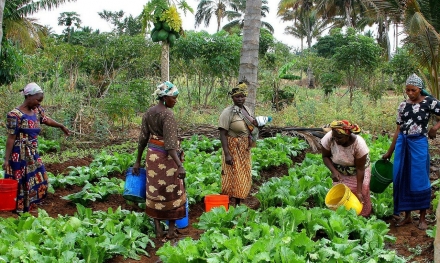Arkaute, may 12, 2021. The Covid-19 crisis is impacting in a much deeper way on family farmers, who are, among the most vulnerable population. However, family farmers and their organizations have been in the frontline since the beginning of the Covid-19 crisis, ensuring consumers’ access to quality and healthy food, demonstrating their huge potential to ensure inclusive, equitable, and sustainable food systems and the basis of livelihood development.
The WRF together with the International Fund for Agricultural Development (IFAD) worked on gathering the experience of family farmers in policy dialogue. The conclusions can be found in the report “Covid-19, family farming and the United Nations Decade of Family Farming 2019-2028 (UNDFF) Improving policy dialogue and supporting family farmers to better cope with future crises” (in English, Spanish and French). This synthesis report includes an analysis of the Covid-19 crisis on the implementation and emerging processes of the United Nations Decade of Family Farming (UNDFF) in 41 countries along with specific recommendations for using the Decade processes to strengthen family farming in the countries.
The UNDFF is an ongoing multistakeholders process to empower the family farming sector by supporting its resilience, profitability and sustainability, while continuing to contribute to the development of sustainable food systems. The National Committees for Family Farming (NCFFs) play a central role in implementing the UNDFF at the national level. The NCFFs are multistakeholders policy dialogue platforms on Family Farming started before 2014, in the framework of the International Year of Family Farming (IYFF 2014) and focused in promoting the development of public policies in favour of Family Farming. Nowadays there are 45 NCFFs in Africa, Asia and the Pacific, Europe, Latin America, and the Caribbean that gather more than 1,570 Farmers’ organizations (FOs), NGOs, public institutions, research centres, cooperation agencies, etc. At least 925 of the members are farmers’ organizations.
During the Covid-19 crisis the National Committees and their farmers’ organizations were playing a strategic role at the national level to gather local information, report and share it with the local authorities, national government and its ministries+: state of the agricultural season, problems related to the shortages of seeds, inputs, difficulties in access to market, to transportation, to information, etc.
They were also fundamental in proposing responses to these and other challenges, in constant dialogue with governments and other stakeholders, emphasising the importance of connecting short-term measures with a strategic vision on how to improve the resilience of local family farming -based on sustainable food systems.
The NCFFs provide platforms for different stakeholders in the country to interact, analyse and discuss the current state of the agriculture and food sector, and to propose and agree on strategies to improve it. In many cases, they contribute to strengthening the role of civil society, especially farmers’ organisations, in the decision-making process, improving the capacity to organise, articulate and build relationships between a wide range of stakeholders.
The enormous potential of NCFFs in the policy dialogue processes should be unleashed to have the appropriate space and to propose debate and agree on public policy frameworks, laws, regulations needed to strengthen family farming and address food systems inequalities.



